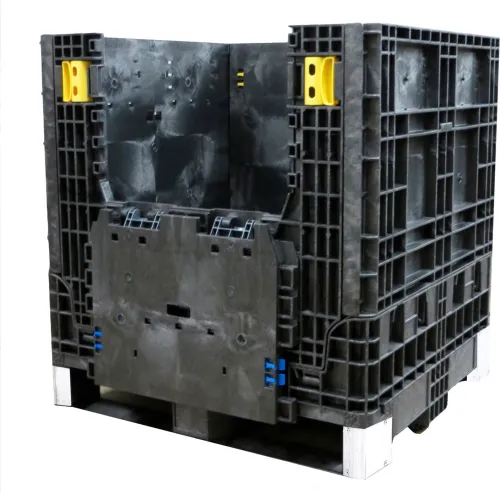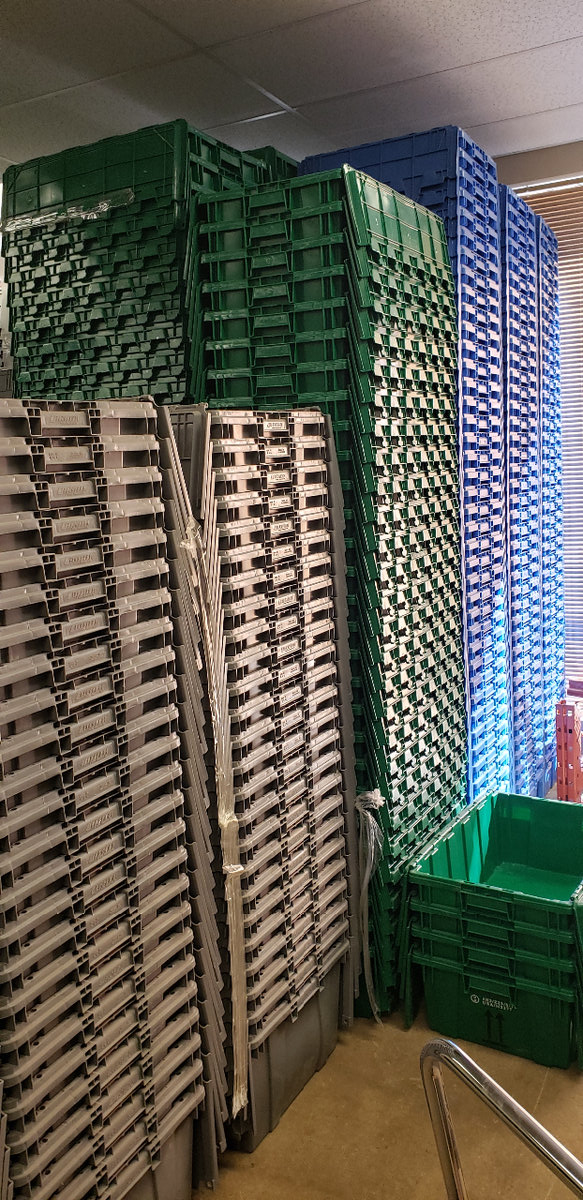Discover durable solutions with used plastic containers for safe storage
Wiki Article
Exactly How Mass Containers Can Boost Efficiency in Your Product Packaging Operations
Bulk containers play an essential role in enhancing product packaging procedures. Their design allows much better usage of upright room and promotes arranged supply administration. This performance brings about decreased product replenishment frequency and lower labor costs. Additionally, the resilience of these containers reduces product damage. As companies look for means to boost their processes, recognizing the complex advantages of mass containers becomes essential. What other benefits might they offer the table?Structured Storage Solutions
As companies look for to maximize their procedures, structured storage solutions have come to be essential for improving packaging effectiveness. Reliable storage space not only saves space yet likewise promotes quicker accessibility to products, which is important in busy manufacturing settings. Bulk containers, created for simple piling and organization, considerably decrease the complexity of storage systems. They enable services to make best use of vertical space while decreasing the impact required for inventory.In addition, these containers commonly include ergonomic styles that simplify handling and transportation, reducing the risk of injury and enhancing workflow. By combining materials in mass containers, companies can lower the frequency of restocking and simplify their supply chain processes. In general, the implementation of efficient storage space remedies promotes a much more organized office, causing raised performance and lowered operational prices. With thoughtful layout and strategic use mass containers, organizations can attain significant improvements in their product packaging operations.

Waste Reduction and Sustainability
While the search of efficiency usually drives product packaging decisions, waste reduction and sustainability have actually become vital factors to consider in modern-day procedures. Companies progressively identify that embracing mass containers can substantially minimize product waste. These containers usually use much less packaging product than typical methods, causing a smaller carbon impact.Bulk containers can be recycled multiple times, which better decreases the need for single-use packaging and lowers general waste entering garbage dumps. Their style often permits simpler recycling procedures, lining up with sustainability goals.
In addition, companies that prioritize waste reduction can enhance their brand name reputation, attracting environmentally aware consumers. By carrying out bulk containers, services not only improve operations yet also add favorably to environmental stewardship. This dual benefit of functional effectiveness and sustainability positions firms favorably in an affordable market progressively concentrated on eco-friendly techniques.
Boosted Assembly Line Efficiency

Carrying out bulk containers on setting up lines considerably improves performance by simplifying the handling and transport of materials. By making use of mass containers, makers can reduce the regularity of material replenishment, allowing employees to focus on assembly jobs instead of consistent stock monitoring. This results in fewer disturbances and a smoother workflow, inevitably improving efficiency.
Furthermore, mass containers are developed for very easy integration with automated systems, further optimizing the setting up procedure. Their standard shapes and sizes assist in far better company, making it possible for workers to locate and gain access to materials swiftly. This decrease in search time adds to a more fluid production setting.

Price Financial Savings and Improved Earnings Margins
Remarkable cost savings can be understood through the fostering of bulk containers in packaging processes. By minimizing the demand for several smaller bundles, firms can lower product costs significantly. Mass containers usually require much less packaging product on the whole, leading to lower expenditures on products. Additionally, the effectiveness of mass handling lessens labor expenses connected with packaging and unpacking, additionally enhancing savings.Less journeys used collapsible bulk containers to suppliers and decreased transport expenses are also key advantages, as mass containers enable raised product capacity per shipment. This higher volume not just minimizes shipping expenses however additionally enhances storage space within facilities, leading to boosted inventory monitoring.
In addition, the sturdiness of bulk containers frequently converts to decrease damage prices during handling and transport, protecting product integrity and reducing waste. Jointly, these aspects contribute to improved earnings margins, making bulk containers a financially advantageous choice for services seeking efficiency in their packaging procedures.
Flexibility Throughout Industries
Mass containers use exceptional versatility throughout numerous markets, making them a useful possession beyond simply cost financial savings. In the food and drink market, these containers help with the risk-free transportation and storage space of big quantities of active ingredients, improving performance in production lines. In drugs, bulk containers assure compliance with rigorous hygiene criteria while suiting the bulk handling of raw products. The chemical market additionally benefits, as these containers hold up against severe materials and avoid contamination, sustaining safe operations. used plastic containers. Furthermore, the farming sector uses mass containers for transferring fertilizers and grains, enhancing logistics and reducing waste. Their flexibility extends to production, where mass containers simplify assembly processes and decrease the requirement for too much product packaging. This cross-industry functionality not only improves functional performance yet also promotes sustainability through minimized product packaging waste, highlighting the integral role bulk containers play in modern supply chainsRegularly Asked Questions
Just How Do Bulk Containers Effect Worker Safety And Security in Packaging Procedures?
Bulk containers greatly enhance staff member safety and security in product packaging operations by minimizing manual handling, minimizing injury threats, and advertising ergonomic practices. Their design promotes more secure transportation and storage, inevitably producing a much more protected work environment for all workers.
What Products Are Mass Containers Commonly Made From?
Mass containers are commonly made from resilient materials such as high-density polyethylene, steel, polypropylene, or wood - used collapsible containers. These materials give stamina, resistance to ecological aspects, and suitability for different contents, ensuring risk-free and efficient transportation of items
Can Bulk Containers Be Custom-made for Particular Products?
Yes, bulk containers can be tailored for specific items. Manufacturers commonly tailor dimensions, products, and includes to meet special requirements, making sure ideal security and performance during storage and transport of various products.How Do Mass Containers Affect Transport Logistics?
Mass containers streamline transport logistics by optimizing freight area, minimizing the variety of trips needed, and lessening handling costs (refurbished bulk containers). Their standardized dimensions assist in reliable filling and unloading, ultimately resulting in improved operational effectiveness throughout the supply chainWhat Is the Life Expectancy of Mass Containers in Normal Usage?
The life-span of mass containers in normal usage commonly varies from 5 to 10 years, depending on worldly quality, handling practices, and environmental problems. Appropriate maintenance can considerably prolong their functionality and performance.Executing bulk containers on assembly lines greatly boosts performance by simplifying the handling and transport of products. Bulk containers frequently require less packaging product overall, resulting in lower expenditures on supplies. In pharmaceuticals, bulk containers guarantee conformity with rigorous health requirements while accommodating the bulk handling of raw products. Their versatility prolongs to manufacturing, where mass containers streamline assembly processes and minimize the requirement for excessive product packaging. Mass containers considerably improve employee safety in packaging operations by reducing hands-on handling, reducing injury risks, and advertising ergonomic practices.
Report this wiki page